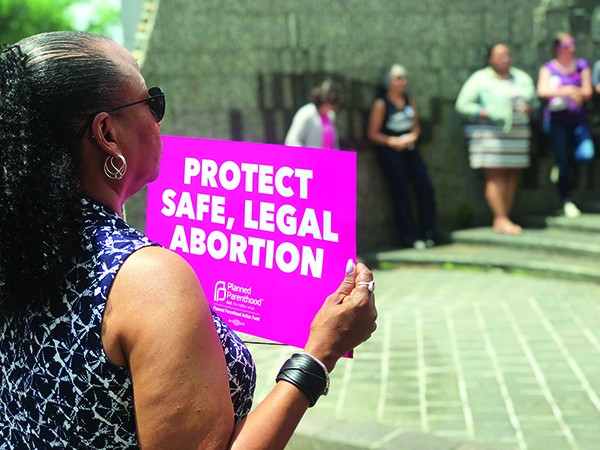More than 10,000 women have left Tennessee to receive abortion care in the two years since Roe v. Wade was overturned, according to Planned Parenthood of Tennessee and North Mississippi. (PPTNM).
The health care group marked the anniversary of the decision with a news conference Monday. PPTNM health centers now provide patient navigation services to those in Tennessee and Mississippi who need to travel out of state for abortion care. The group has provided assistance to over 800 patients.
Ashley Coffield, the group’s CEO, said it’s “dangerous” to be pregnant in Tennessee.
“Two years after the Dobbs decision allowed our state’s abortion ban to take effect Tennessee is in a state of crisis,” Coffield said. “It is dangerous to be pregnant here.”
“We are living without a basic freedom and access to life-saving care that we never thought would go away, and people are afraid,” Coffield added. “The attacks on reproductive rights have not stopped.”
Seven women and two providers are suing the state because they had to receive the procedure elsewhere, Cofield said.
The Tennessee General Assembly passed legislation this year that makes it a criminal offense for adults to help minors access abortion care out of state. The legislation also allows for another person to sue the person found guilty of “abortion trafficking” for the death of the unborn child, and is set to go into effect on July 1.
Planned Parenthood said they are still able to help minors with the consent of an adult through their Planned Parenthood Direct service where they can provide birth control and contraceptives through tele-health.
The organization is also able to provide care at a reduced cost thanks to their Title X services. In 2023 PPTNM was awarded $3.9 million to be used over the next three years. The funds came from the Virginia League for Planned Parenthood and given so PPTNM could continue providing free care to patients in need after it was announced in April that the state of Tennessee was no longer eligible for Title X funding. This was due to the state’s inability to provide “abortion referrals upon client request.”
Tennessee lawmakers marked the anniversary, too. Senate Democratic Caucus members Sen. Raumesh Akbari (D-Memphis), Sen. London Lamar (D-Memphis), Sen. Charlane Oliver (D-Nashville), Sen. Sara Kyle (D-Memphis) and Sen. Heidi Campbell (D-Nashville) issued a joint statement condemning Tennessee’s restrictions.
“None of us ever thought we would live in an America where women have fewer rights than our mothers and grandmothers or that politicians would use the power of the government to decide when or if we grow our family,” the statement said.
The lawmakers also said they are “more determined than ever to restore this basic freedom to every woman in Tennessee.”
PPTNM’s Coffield said that her group anticipates restrictions on reproductive rights “can get worse,” yet they are committed to keeping their doors open for people who need access to abortion care through their navigation services.
In 2022, the U.S. Supreme Court overturned the ruling made in the landmark case, Roe v. Wade, which protected a woman’s right to choose an abortion. A day after the decision, a Tennessee law went into effect that made providing abortions a felony. The Human Life Protection Act “was passed in 2019 just in case the U.S. Supreme Court ever overturned the landmark Roe v. Wade.”
At the time of its passage, the law did not allow abortions in cases of rape, incest, or any fetal abnormality that could prove fatal to the baby. The law only allowed an abortion in Tennessee if giving birth would kill the pregnant woman or would prevent “serious risk of substantial and irreversible impairment of major bodily function.”

